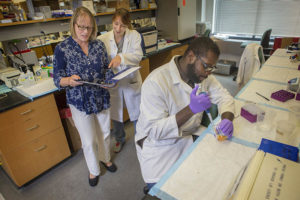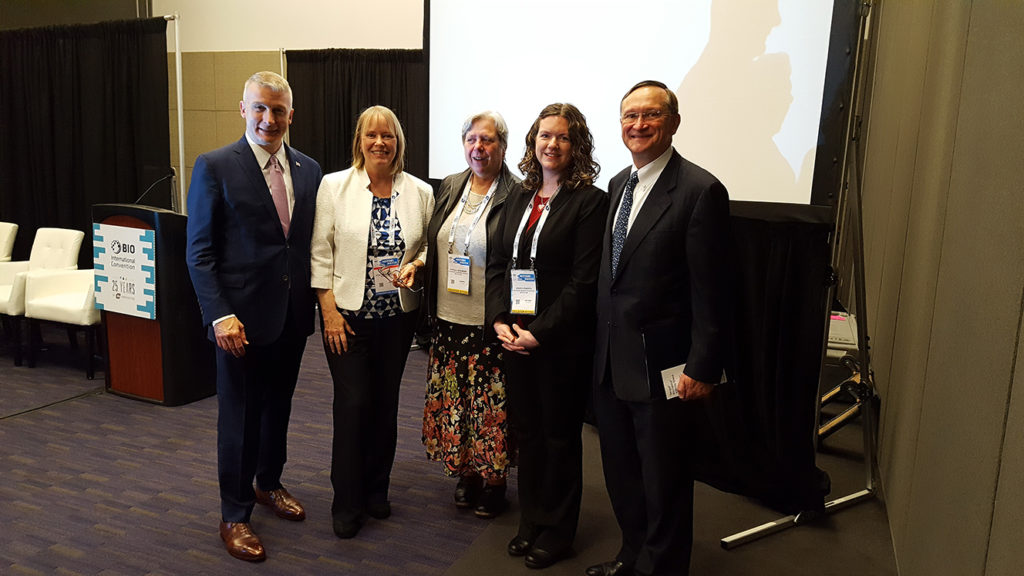Seasoned Industry Veterans Join Long Island Bioscience Hub’s BioEntrepreneur-in Residence Initiative
The Long Island Bioscience Hub, a collaboration between Stony Brook University, Brookhaven National Laboratory, Cold Spring Harbor Laboratory, and the Feinstein Institute at Northwell Health, announced the appointment of Dr. Boris Shor and Mr. Peter Young as its newest BioEntrepreneurs-In-Residence (BEIRs). Dr. Shor and Mr. Young have extensive bioscience industry experience affording them unique perspectives in the role of Bio Entrepreneur-in-Residence. Each will work with the Center for Biotechnology to identify commercially promising academic technologies that have the potential to support company formation.
Dr. Shor has nearly 15 years of experience in leading oncology programs and external R&D partnerships at the large pharmas and biotech companies, with specific focus on preclinical development of small molecule kinase inhibitors and biologics. Previously at Pfizer, Dr. Shor led internal and external collaboration project teams to develop novel antibody-drug conjugates and supported BLA filing for Inotuzumab, which was approved for the treatment of leukemia in 2017. Prior to that, he was a project team leader at the Oncology Unit of Wyeth, managing the discovery of novel kinase inhibitors for the treatment of cancer. He currently serves on the executive management team of early-stage biotech companies and is a founder of BioIDEA, a biotech pitch event in New York City. Dr. Shor received a Ph.D. in Molecular and Cell Biology at the State University of New York Downstate Medical Center and performed a postdoctoral fellowship in the Inflammation Research team at Johnson & Johnson Pharmaceutical R&D prior to joining Pfizer.
Mr. Young is an experienced life science industry consultant with over thirty-five years experience and currently serves as an executive-in-residence with Pappas Capital, where he leads the firm’s initiatives in translational research. He also serves on the Oversight Committee for the University of Miami Wallace H. Coulter Center for Translational Research and the Long Island Bioscience Hub External Review Board. He is a past member of the BIO board and chairman of NCBIO, the North Carolina industry trade association. Mr. Young earned a BA in History and an MBA from Indiana University.
“We couldn’t be more delighted to add Boris and Peter to the Center for Biotechnology’s roster of BioEntrepreneurs-in-Residence. The ongoing expansion of the BioEntrepreneur-in-Residence program is critical for the continued development of the bioscience industry in the region” Diane Fabel, Director of Operations at the Center for Biotechnology said. “The attraction and retention of skilled bioscience management talent is an important component of ensuring companies can be launched and also grow here.”
“I am thrilled to join the Center for Biotechnology as a BioEntrepreneur-in-Residence” Dr. Shor stated, “and I have already begun the work of assessing technologies and building a company. I appreciate the resources the Center for Biotechnology offers through their many programs not only to me, but to emerging companies throughout New York.”
“Having worked with the Center for Biotechnology as an advisor for several years, I am pleased to formally join the Center as BioEntrepreneur-in-Residence” Peter Young stated. “There is an incredible amount of activity related to bioscience development currently taking place right now in the region, and the Center’s many entrepreneurial programs provide a great springboard for significant industry expansion – I’m thrilled to be a part of it.”
In their roles as BEIRs, Dr. Shor and Mr. Young will work to identify a technology or technologies from within partner institutions that will create the foundation for licensing and company formation. They will have the support of the Center for Biotechnology business and technology development staff, as well as the support of external industry advisors to develop successful commercialization strategies. Ultimately, the goal is to help the company position itself prepare for SBIR/STTR grant opportunities, and Angel and VC investment.
Dr. Shor and Mr. Young join the eight BEIRs already working with the Center for Biotechnology who collectively have launched ten new companies in the last five years.

